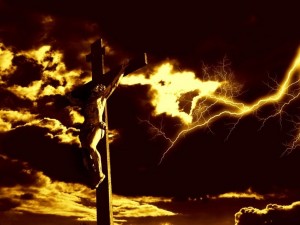 On this Good Friday, I want to draw attention to another aspect of the atonement of Christ. Our traditional theological explanation is to say that Jesus died on the cross so we might escape the penalty for our sins. Most of the time we seem to treat it as a type of commercial transaction. Sure, we are grateful we don’t have to bear the consequences, but all too often we see what Jesus did as some kind of transfer: God the Father got mad at Him instead of us. Whew, that was close.
On this Good Friday, I want to draw attention to another aspect of the atonement of Christ. Our traditional theological explanation is to say that Jesus died on the cross so we might escape the penalty for our sins. Most of the time we seem to treat it as a type of commercial transaction. Sure, we are grateful we don’t have to bear the consequences, but all too often we see what Jesus did as some kind of transfer: God the Father got mad at Him instead of us. Whew, that was close.
I don’t accept the idea that God was angry at Jesus, that He couldn’t stand Him at that moment because of all that ugly sin attached to Him. Well, the Father did abandon Him, right? It must have been, as the majority of preachers say, that He was pouring out judgment upon Him because He became the personification of sin. The scripture used to back that up is the one that says Jesus became sin. Yet a closer examination of the Greek shows a better translation is He became a sin offering—not the same thing.
Why did the Father turn away? Two reasons, I believe. First, Jesus had to suffer this alone. Just as any sinner separated from God will feel supreme emptiness at the Last Judgment, so Jesus had to fully grasp that experience. We’re told in the book of Hebrews He had to be made like us in all things so He could be the perfect sacrifice. He had to undergo every temptation as a man to be able to take our place. Yet until that moment on the cross when the Father turned away, He never had experienced alienation from Him. Throughout all eternity past, they were One. Now, for this one agonizing moment, He fully experienced the feeling of separation.
Second, and this is where some may say I’m speculating too much, think about the effect on the Father as well. This was new to Him also. He had never been separated from the Son. If Jesus was suffering, wasn’t the Father also? Yes, Jesus carried out the physical suffering, but both grieved in their hearts.
You see, God the Father and God the Son are not some faraway entities. They live with us, feel with us, work with us at all times. The crucifixion was an intensely personal act.
 The other half of this is that we so cavalierly tell others to accept what Jesus has done for them and they can live forever. It’s much deeper than that. We need to come to grips with the personal nature of the crucifixion. We need to “see” the agony Jesus voluntarily submitted to for our sake. In our spirits, we need to view the cross as more than a commercial transaction where we dodge a bullet or have a debt paid. We need to gaze upon Jesus on that cross, realize the degree of His suffering, both physical and spiritual, and be so humbled by His love for us that we would never again want to do anything that would bring even more grief to Him.
The other half of this is that we so cavalierly tell others to accept what Jesus has done for them and they can live forever. It’s much deeper than that. We need to come to grips with the personal nature of the crucifixion. We need to “see” the agony Jesus voluntarily submitted to for our sake. In our spirits, we need to view the cross as more than a commercial transaction where we dodge a bullet or have a debt paid. We need to gaze upon Jesus on that cross, realize the degree of His suffering, both physical and spiritual, and be so humbled by His love for us that we would never again want to do anything that would bring even more grief to Him.
In other words, we need a stronger sense of the absolute evil of every sin—the bottomless selfishness of every sinful thought or action—in order to bring us to a place of genuine repentance. The cross should break us down, humble us to the point where our commitment to Him is to live a life that honors Him at all times.
Salvation is not one prayer, and too often we push people into praying a prayer of salvation that may be phony. That prayer will only be real when we first acknowledge our complete spiritual poverty without Him and seek His forgiveness. When we come to that point, when we know in our spirit that we are nothing without Him, only then can we begin to walk in newness of life.
On this Good Friday, we should contemplate not some payment of a debt, but rather the kind of love that would lead the God of all creation to empty Himself of all Godhood, and to humble Himself by becoming obedient to the point of death, even death on a cross. If we understand the depth of that love, we will be changed. And that’s what it’s all about anyway.
